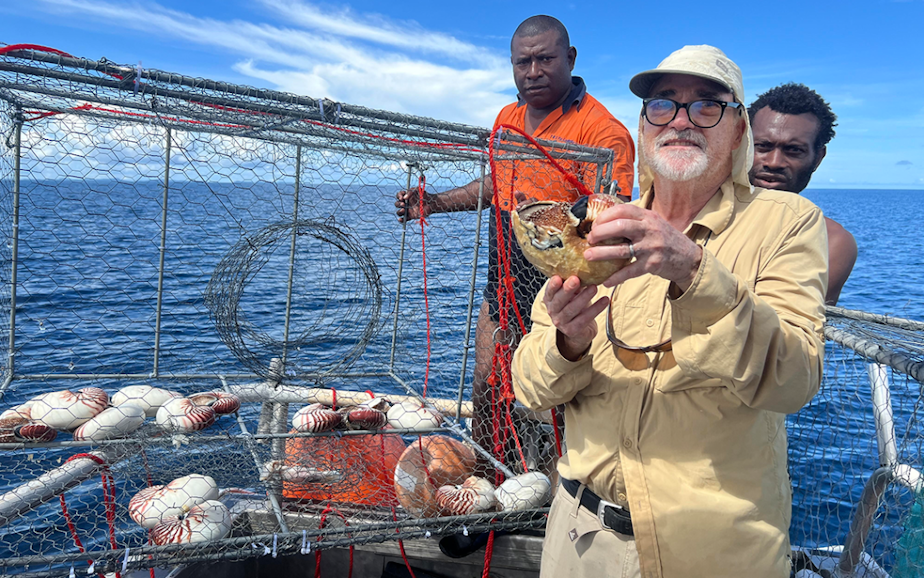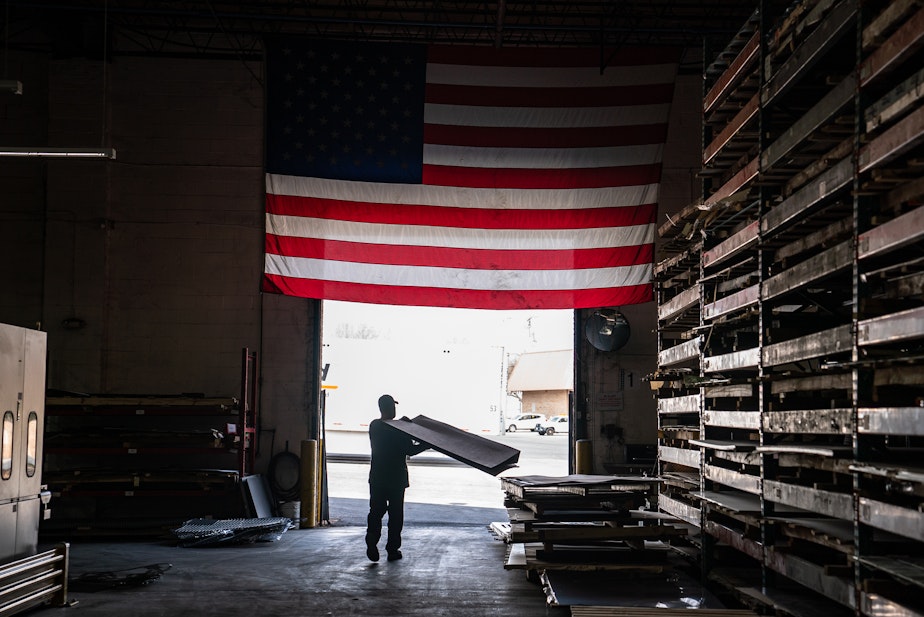The second time the same ferry has crashed on Bainbridge Island: Today So Far
- The sun now sets after 8 p.m. in the Northwest!
- How do you get off a ferry boat after it runs aground at Bainbridge Island?
- If you have a spare $200,000 laying around, here are some tips for what to do with it.
- Questions around Washington's recent "middle housing" move.
This post originally appeared in KUOW's Today So Far newsletter for April 17, 2023.
It may seem like so long ago, but the last time our region saw sunsets after 8 p.m. was ... last night. Before that, sunsets after 8 p.m. were last seen on Aug. 26. Just a nice warm thought to start the week.
Despite how grown up Bainbridge Island is, it still maintains a small town vibe where everybody knows somebody, who knows somebody. Case-in-point: It's been years since I lived on Bainbridge Island, yet my phone kept buzzing while I was deep into some gardening soil in Tacoma this weekend. It was my friend Liz in Los Angeles. She was sending me videos from her dad on Bainbridge Island, which showed a ferry "crashing" into the sandy shores at the south end of the island. I put "crashing" in quotes, because it was a slow, soft nudge up onto the beach. Despite being a few years and cities away, Bainbridge is still a town where I know someone, who knows someone — chit-chat can echo from the island to LA to Tacoma within minutes.
That's how the news of the M/V Walla Walla running aground got started Saturday. Like most good stories, it came from people like you getting in touch with KUOW. Shortly after departing the Bremerton ferry dock, the ferry's generator reportedly failed while in Rich Passage, a stretch of waterway that runs along the south end of Bainbridge Island. Ferries pass through it en route to Seattle every day. When the Walla Walla lost power, it lost the ability to steer, and the boat coasted into the island shore.
"They made an announcement that we had lost steering and propulsion and we were going to run aground," Haley Socha told KUOW while still on the ferry that day. "They announced we should brace for impact. Gradually, we scraped the bottom and then ran aground on Bainbridge Island."
Ann Wilkinson Ellis has often watched ferries pass by her Bainbridge house, but knew something was wrong on Saturday.
"We heard this explosion ... we have never heard that sound before," Wilkinson Ellis said. "We ran out on our deck ... the Walla Walla, sadly, one of my favorite ferry boats, was drifting into Pleasant Beach and grounded there, north of Lytle Beach and south of Lynwood Center, right in front of people's homes."
The Walla Walla opened its galley for the more than 600 people waiting to hear how they were going to get off the ferry. Coast Guard boats were dispatched to the area. Within minutes, www.istheferrystillstuck.com went online with a single purpose — watch the ferry to see if it was still stuck. Island kids set up a hot cocoa table on the beach, just in case passengers would be coming ashore. By 8 p.m., passengers were being offloaded to a Kitsap Fast Ferry, which runs the same route. All passengers were off the ferry shortly before 11 p.m.
After midnight, the tide rose, making it easier to tow the ferry away. The M/V Walla Walla was returned to the Bremerton dock. IsTheFerryStillStuck.com was updated.
Read more and see video of the incident here.
Here's a tip: If you want to give away a lot of money, consider a raffle, or give it to a worthy cause, or call me up. What you should not do is toss $200,000 out of your car window while driving down a freeway. That's what one Oregon man did recently, which caused quite a scene.
Drivers along I-5 through Eugene realized what was fluttering through the air and quickly stopped on the freeway to pick up as many $100 bills as they could. Oregon State Police have asked drivers to not park along the freeway to look for any lingering bills, because that's dangerous. Also, previous drivers already did a "thorough job of gathering the loose money."
You've likely heard it reported quite often in recent months that Washington state needs about one million new housing units to meet the demand. The state Legislature just passed some "middle housing" measures to help meet that demand. As KUOW's Joshua McNichols recently reported, middle housing such as duplexes, fourplexes, sixplexes, etc. will be able to accomodate about 20% of the need. There are various factors that come into play here, such as the size of the city where the new housing is located. Also, the middle housing bills passed by the Senate and the House are slightly different and still need to be aligned before going to the governor for a signature.
Soundside took inquiries from listeners and ran them past folks in-the-know around middle housing. For example, parking. Parking is a point of contention within this issue. Projects that include parking are more expensive than projects that don't (I'm no rocket surgeon in economics, but I would have assumed that is the case). Plus, if you don't give space to parking, that space could be used for more housing. Of course, there's the fact that if you don't have parking ... where are people's cars going to go? People still need to get around, whether or not they have a parking space. At the very least, you still need a car to get to a park-and-ride. So how did the parking issue play out in the Legislature? Check out Soundside's full segment here.
Can you guess my feedback? Regular TSF listeners probably know what I'm going to say — just don't make them ugly. All these plexes are great ideas, and a lot of work went into this solution. But if developers put up more oddly painted, panelled, ticky tacky eyesores like we've been seeing around our cities, it just gives ammunition to folks who don't want anything new in their neighborhood. People won't see a home, or new neighbors, or a lovely addition to the community. They'll just see a giant orange box. That makes it more difficult to get more solutions down the road. Just throwing that out there for future housing developers.
AS SEEN ON KUOW

DID YOU KNOW?
It was a cold spring day in April when the M/V Walla Walla was passing through Rich Passage and ended up running aground at the south end of Bainbridge Island ... in 1981.
The April 15, 2023 ferry incident will go down in the history books, and become quite confusing — because it's the second time the M/V Walla Walla has run aground. The last time the ferry ran aground was the morning of April 23, 1981. It also happened in Rich Passage, also on Bainbridge Island, and also in April.
On that day, 42 years ago, the ferry ran aground at around 7:50 a.m. in foggy weather. There were about 600 passengers aboard, many of whom had to abandon 172 vehicles. UPI reported that passengers were "gingerly transferred from the listing vessel to a barge and two tour boats."
Just like this recent incident, the tide was low when the ferry ran aground in 1981, meaning crews had to wait for high tide before an opportunity to tow it away.
ALSO ON OUR MINDS

The supply chain snafus seen across the U.S. economy during the pandemic have bolstered a central plank of President Biden's economic policy: he says that now is the time to invest in America, make things in America, and buy things made in America.

